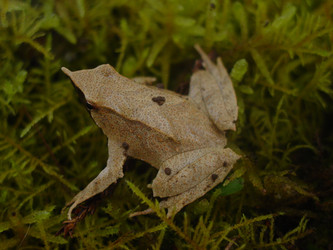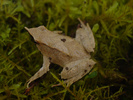Rhinoderma
Darwin's Frogs
- Rhinoderma darwinii
- Rhinoderma rufum
Introduction
Rhinoderma is known from the cool, temperate forests of southern Chile and Argentina. The frogs are small, about 30 mm long. In Rhinoderma darwinii, the males carry the tadpoles in their vocal sacs, and development is completed as froglets. Rhinoderma has been placed in its own family Rhinodermatidae primarily because of its unusual mode of development. Were it not for this, Rhinoderma would be considered simply a genus within Hyloidea, but without obvious relationships to other taxa. No fossils are known.
Taxonomy
Ford and Cannatella (1993) defined the name Rhinoderma for the node that is the last common ancestor of Rhinoderma rufum and R. darwinii. The family-group name Rhinodermatidae is redundant with Rhinoderma. This genus is diagnosed by rearing of the larvae in the vocal sac of the male, and recognition of the taxon as a family is based on this apomorphy. The known derived characters of Rhinoderma (Lynch, 1971) do not clarify its relationships.
References
Ford, L. S., and D. C. Cannatella. 1993. The major clades of frogs. Herp. Monogr. 7:94-117.
Lynch, J. D. 1971. Evolutionary relationships, osteology, and zoogeography of leptodactyloid frogs. Misc. Publ. Mus. Nat. Hist. Univ. Kansas (53):531-238.
Title Illustrations

| Scientific Name | Rhinoderma darwinii |
|---|---|
| Specimen Condition | Live Specimen |
| Source | "Sapito de Darwin" Rhinoderma darwinii |
| Source Collection | Flickr |
| Image Use |
 This media file is licensed under the Creative Commons Attribution-NonCommercial License - Version 2.0. This media file is licensed under the Creative Commons Attribution-NonCommercial License - Version 2.0.
|
| Copyright | © 2004 Felipe |
About This Page
If you are interested in authoring or co-authoring the page for this taxon, or some part of it (even a species), contact David Cannatella.
Correspondence regarding this page should be directed to David Cannatella at
Page copyright © 1995
 Page: Tree of Life
Rhinoderma. Darwin's Frogs.
The TEXT of this page is licensed under the
Creative Commons Attribution License - Version 3.0. Note that images and other media
featured on this page are each governed by their own license, and they may or may not be available
for reuse. Click on an image or a media link to access the media data window, which provides the
relevant licensing information. For the general terms and conditions of ToL material reuse and
redistribution, please see the Tree of Life Copyright
Policies.
Page: Tree of Life
Rhinoderma. Darwin's Frogs.
The TEXT of this page is licensed under the
Creative Commons Attribution License - Version 3.0. Note that images and other media
featured on this page are each governed by their own license, and they may or may not be available
for reuse. Click on an image or a media link to access the media data window, which provides the
relevant licensing information. For the general terms and conditions of ToL material reuse and
redistribution, please see the Tree of Life Copyright
Policies.
Citing this page:
Tree of Life Web Project. 1995. Rhinoderma. Darwin's Frogs. Version 01 January 1995 (under construction). http://tolweb.org/Rhinoderma/16948/1995.01.01 in The Tree of Life Web Project, http://tolweb.org/









 Go to quick links
Go to quick search
Go to navigation for this section of the ToL site
Go to detailed links for the ToL site
Go to quick links
Go to quick search
Go to navigation for this section of the ToL site
Go to detailed links for the ToL site